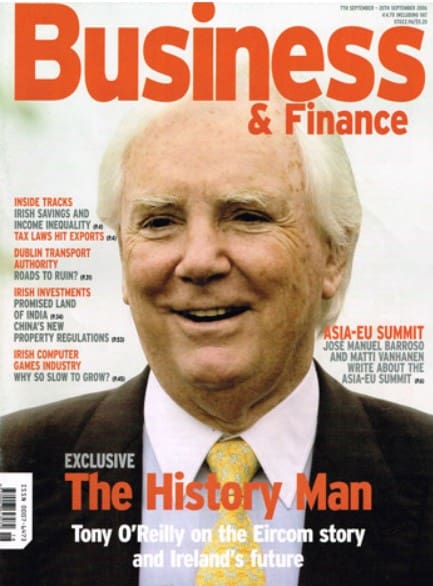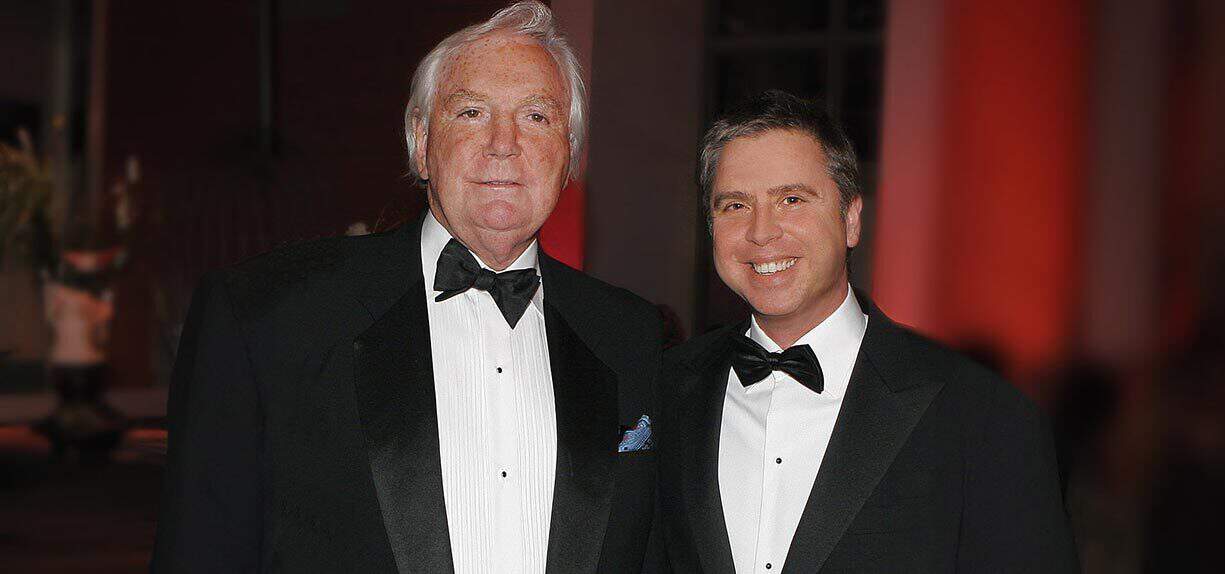Tony O’Reilly: A personal reflection, by Ian Hyland
When I joined the Irish Press Group in the late 1980s as a junior in a Mad Men-styled advertising department, the newspaper was already under pressure from the Independent titles.
The daily Irish Press was undergoing yet another relaunch, and the Evening Press, once head and shoulders above the Herald, was struggling to keep up with its main rival. Only the odd house giveaway or the legendary prose of Con Houlihan on a Monday kept it within touching distance.
 The Sunday Press versus the Sunday Independent was a week-by-week battle, regularly holding its own at 450,000 weekly sales thanks to its loyal Fianna Fáil/country readership, and once a year breaking 500,000 copies, usually on an All-Ireland Sunday boosted by a double ‘spot the ball’ competition, shading the Sindo numbers. This was a rarity however.
The Sunday Press versus the Sunday Independent was a week-by-week battle, regularly holding its own at 450,000 weekly sales thanks to its loyal Fianna Fáil/country readership, and once a year breaking 500,000 copies, usually on an All-Ireland Sunday boosted by a double ‘spot the ball’ competition, shading the Sindo numbers. This was a rarity however.
That said, it was a wonderful time for a young aspiring advertising sales executive with ambitions to cut his teeth in marketing.
The Irish Press took great pride in further educating its staff – in my case four years of studying marketing by night. It was an opportunity offered by few other employers at a bleak time.
Ireland had very little to offer in the 1980s, so inevitably people with ambition looked further afield for opportunities and inspiration. At the time there were a handful of Irish success stories to aspire towards.
Michael Smurfit had mastered the leverage buyout to grow the Smurfit brand in the US; Niall FitzGerald was climbing to the top of the corporate ladder at Unilever, and then there was Tony O’Reilly. Tony had become the President & Chief Executive Officer of one of the biggest corporations in the United State, HJ Heinz, through his genius for branding.
In the late 1990s, I landed in the Smurfit majority-owned Media & Publishing business, which owned Business & Finance. At the time it was Ireland’s weekly business magazine and had been launched in 1964 by Hugh McLoughlin and its first editor Nick Leonard, who were later joined by another marketing wiz Gerry McGuinness, who eventually sold the Sunday World to INM.
Working for Business & Finance as a still youthful Advertising/Commercial Director in the 1990s provided a wonderful platform to meet many of the leading business figures of the day. Moreover, its annual ‘Man of the Year’ luncheon was the Oscars for the Irish business community.
Having left the Business & Finance media business in 2000, I returned to acquire it when it hit the rocks in January 2002. While it was a challenging period for the company, Business & Finance, thanks to its exceptional staff of journalists, maintained its influence as a business periodical, largely because of its coverage of the main stories of the day. One of these was the Eircom takeover battle between Denis O’Brien and Tony O’Reilly.
By the noughties, the Business & Finance Awards had replaced the Man of the Year Award. It had become an important forum to recognise and celebrate Irish business success. And not just domestic success stories, but the growing number of Irish people making an impact at a global level.
Tony was always going to be top of my list. However, for one reason or another – mainly his packed travel diary – it was difficult to achieve. Over the period of the early-to-mid noughties, we had the privilege of hosting and honouring some outstanding business leaders, including Michael Smurfit, Tony Ryan, and Dermot Desmond.

However, in the Summer of 2006, I received a call from Jim Milton, a former editor of Business & Finance and founder of Murray Consultants. Jim was a very well-connected guy and communications counsel to a portfolio of business leaders, corporations and other influential figures including in government. Jim was also a trusted consigliere to Tony O’Reilly.
“Ian, Tony would like to take you to lunch. In Deauville,” was how Jim opened the conversation. So to say I was a little blindsided is an understatement.
2006 was not a bad year for Tony; his holding at HJ Heinz was doing very well and his other interests including INM Plc and Providence Resources were trading strongly. His Valentia consortium, which included George Soros, had in 2005 sold Eircom to Babcock & Brown for a considerable profit.
As you can imagine, my response was as expected. I travelled to Deauville, along with Jim Milton, David McRedmond (then Commercial Director at Eircom) and Constantin Gurdgiev, who was the editor of Business & Finance.
We arrived at the imposing residence to be greeted and escorted to a reception area. I was immediately drawn to two things, the first being the simplicity of the home for such a titan of business and personal branding.
Tony O’Reilly built things, businesses, networks. He defined philanthropy, creating The Ireland Funds with Dan Rooney. He put Ireland on the map. He left everything on the pitch of rugby and life, and helped change the way Irish business people thought about their ambition and potential.
The second thing I was drawn to was the up-to-date business and political periodicals piled on the coffee table, which included Der Spiegel, the Wall Street Journal, Financial Times, Washington Post, the Economist and for good measure, Business & Finance.
Tony entered the room and moved immediately to greet me. “I am delighted we could find time to meet at last”. I’d imagine I was a lot more delighted than he was, but the gesture was very much appreciated.
We sat for a light lunch with no alcohol. Apart from Tony’s legendary stories of Brendan Behan, travelling with Liam Healy in India, and his exploits on the rugby pitch, he shared his deep knowledge of media, business, and the geopolitical landscape. He interjected with a story of some kind or another which included rugby centred references, possibly aimed to keep your attention, not that this was required.
Constantin was also an Economics Professor at Trinity College and peppered Tony with a number of academic-angled questions. I don’t think Constantin would mind me saying that Tony matched him while sometimes moving the macro topics back to something far more interesting. Constantin finished by asking Tony for his views of the Norwegian model, which Tony skillfully managed to divert.
I realised across our conversation that regardless of the topic or the timeline, Tony had some connection to most, if not all.
So, while the published article from our lunchtime discussion focused mainly on the recent Eircom deal, it also included Tony’s strong opinion on Ireland’s future as an island. There was a genuine passion to reset from the past and the work of his generation and move to a more ambitious future.
Later that year, I hosted Tony and Chryss in the company of 600 business leaders where he was recognised for his Outstanding Achievement in Business. We were joined at the table by Ken (TK) Whitaker who was, that weekend, celebrating his 90th birthday. Two great architects of modern Ireland.
During his remarks, Tony highlighted the policies that had enabled Ireland to transform from being one of the poorest members of the EU to being one of the richest. Of course, Ireland would soon hit the economic buffers, which would have dire consequences for Tony’s business interests.
Tony had a shrewd business mind and he was a genius brand marketeer. He rolled the dice and sometimes it went against him. However, in the words of Kipling, he ultimately accepted the outcome. “If you can meet with triumph and disaster and treat those two imposters just the same.”
On one of Tony’s rare public appearances in recent years he spoke among friends at the opening of the O’Reilly Room at Old Belvedere Rugby Club. Tony concluded his speech with the observation: “The lesson about winning and losing is that if you don’t know how to lose, you don’t know how to live “ showing a perspective on life only derived from the shared experience of winning and losing.
Much has been written and, in the coming days, much will be spoken of Tony. I believe Tony O’Reilly will be regarded as one of the most outstanding Irish people of his generation. He was one of our first global sporting superstars. A man who rose to the top of the corporate world at Heinz. An investor in media and energy. His investment in Waterford Wedgwood ultimately failed, but it was a brand and the idea of an Irish owned global luxury brand, which he passionately believed in.
Tony O’Reilly built things, businesses, networks. He defined philanthropy, creating The Ireland Funds with Dan Rooney. He put Ireland on the map. He left everything on the pitch of rugby and life, and helped change the way Irish business people thought about their ambition and potential.
Tony had a shrewd business mind and he was a genius brand marketeer. He rolled the dice and sometimes it went against him. However, in the words of Kipling, he ultimately accepted the outcome. “If you can meet with triumph and disaster and treat those two imposters just the same.”
On that evening at the O’Reilly Hall, UCD, Tony made a number of humorous observations about business academics. He concluded with the memorable line: “My business hero was Groucho Marx, who said that business success was about honesty and sincerity, and if you can fake that you’ve really made it”. The line was delivered with perfect timing and received with much laughter from the audience.
Tony O’Reilly didn’t fake it. He was the real deal and an Everest amongst the sand dunes.
Rest easy Tony!
About the author: Ian Hyland is President/Publisher Business & Finance, Chairman & Publisher at Quartet Books and President Ireland INC.



